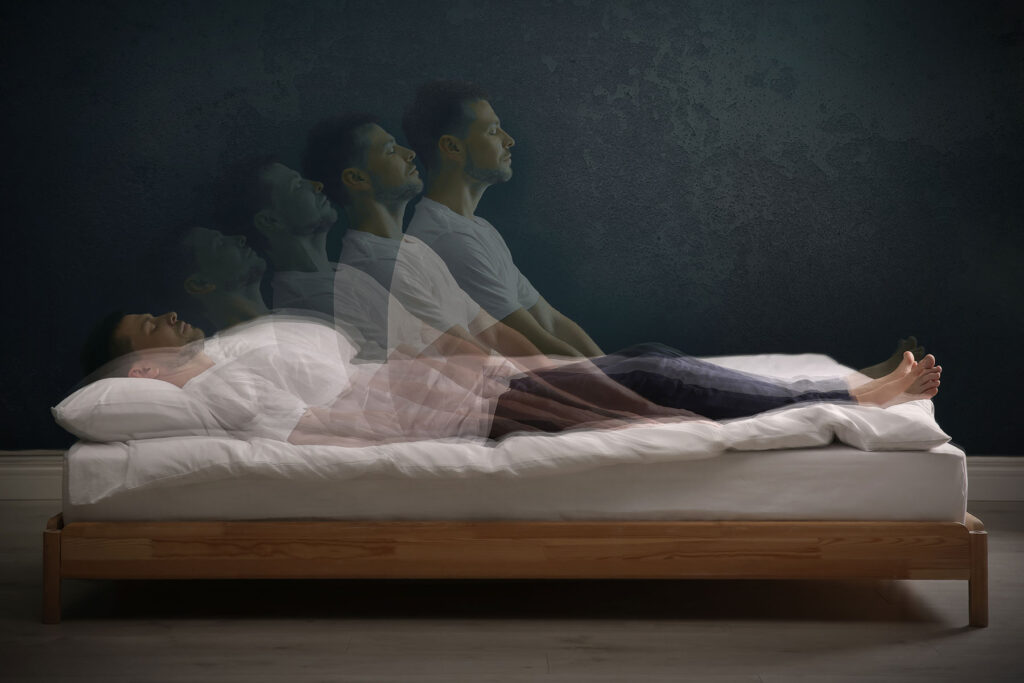Alcohol withdrawal can be a complex process that causes many uncomfortable and even dangerous effects, including sleep paralysis. But how are sleep paralysis and alcohol withdrawal linked? At our alcohol rehab center, Promises, we offer treatment options to help you avoid the worst withdrawal symptoms. Call us at 844.875.5609.
What Is Sleep Paralysis? Knowing What to Expect
Before understanding how sleep paralysis and alcohol withdrawal might be related, you must first know what sleep paralysis is. Normally, as you start falling asleep, your brain sends signals throughout your body telling muscles to relax. This leads to muscle atonia, which keeps you still as you enter REM sleep.
However, you might regain consciousness but find you can’t move or speak. You can still move your eyes and breathe, but you might see things that aren’t there, potentially making the experience very frightening. This is sleep paralysis.
Night Terrors: How Are Sleep Paralysis and Alcohol Withdrawal Linked?
If you have an alcohol addiction and you stop using alcohol suddenly, your body will have difficulty adjusting.
Alcohol abuse causes many chemical and structural changes to the brain. It’s a depressant, decreasing the functions of your central nervous system (CNS). When you stop drinking, your CNS attempts to start functioning again without alcohol.
However, this can result in your CNS becoming hyperactive, leading to symptoms like:
- Increased heart rate
- Increased blood pressure
- Higher body temperature
- Sweating
- Shaking
In some cases, you can also develop delirium tremens, which can cause seizures, hallucinations, and many other symptoms.
What not everyone knows, however, is that sleep paralysis and alcohol withdrawal are indeed linked. Alcohol use can severely impact your sleep cycle because it causes you to sleep shallowly, not letting you get the deep rest your body and mind need. But when you stop using alcohol, your body goes through what’s called REM rebound — a phenomenon that can occur after something (like alcohol use) has kept you from going into REM sleep.
Because you enter REM sleep more rapidly than usual when you’re experiencing REM rebound—and because your entire sleep cycle is off-balance as your body adjusts to not functioning with alcohol in its system—you may experience the kind of deep and vivid dreams you would have in REM sleep outside of it. This can cause sleep paralysis and night terrors.
Getting Help for Alcohol Use Disorders
Sleep paralysis and alcohol withdrawal are common concerns, but you can get help to avoid the worst of the withdrawal symptoms.
When you turn to medical detox services, you can receive the medications you need to keep your body stable while alcohol leaves your system. At our center, we have a thorough evaluation process that allows us to decide on the right medications for your needs.
Medical detox services allow you to focus on therapy and not on the powerful withdrawal effects that might make you more likely to relapse.
After going through the detox process, you can choose the treatment program that’s right for you. For some people, residential treatment can be the best choice. Residential treatment lets you step away from your normal environment so that you don’t have your usual triggers around you.
If you’ve completed residential treatment or find that it’s not the right choice for you, we also offer outpatient services like partial hospitalization programs and intensive outpatient programs. These programs let you receive many hours of treatment while allowing you to go home every afternoon.
Turn to Promises for Alcohol Addiction Treatment Services
At Promises, we offer drug and alcohol addiction treatment services that can help you break away from addiction. Call Promises today at 844.875.5609 to learn more about the programs we offer.

